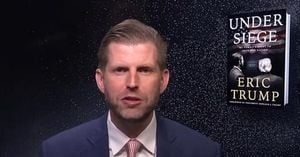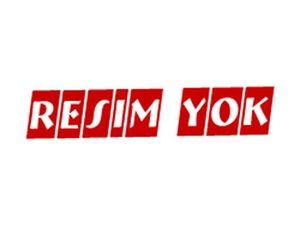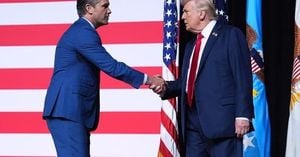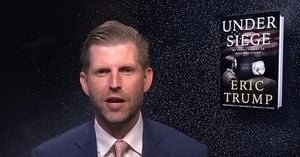On September 30, 2025, Governor Tarcísio de Freitas of São Paulo paid a much-anticipated visit to former president Jair Bolsonaro, who remains under house arrest in Brasília. The meeting, which lasted three hours and included a lunch, took place against the backdrop of a country still reeling from political turbulence and legal uncertainty. Bolsonaro, sentenced to nearly 30 years in prison for crimes against democracy related to the January 8, 2023, coup attempt, has become a lightning rod for Brazil’s political right—and the central figure in heated debates about the nation’s future leadership.
According to Folha de S. Paulo, the conversation between Tarcísio and Bolsonaro covered a wide range of topics, from football to fond memories of their time in government—Tarcísio served as Bolsonaro’s Minister of Infrastructure—but the real focus was the 2026 presidential and state elections. Despite the speculation swirling around his own political future, Bolsonaro refrained from clarifying whom he would support for the presidency. His silence left the assembled political allies and observers with more questions than answers.
The uncertainty hinges on more than just personal ambition. With Bolsonaro’s legal status in flux—he is currently under house arrest, awaiting a final decision from the Supreme Federal Tribunal (STF) on where he will serve his 27-year sentence—any discussion of candidacies is fraught with complications. The former president’s sons, including Flávio and Carlos Bolsonaro, have played an active role in internal negotiations. Flávio, a senator, explained to journalists outside Bolsonaro’s residence, “There will be no decision while we do not know clearly what will happen to this amnesty project. Only after this legislative process and even its final unfolding can we discuss names. There is no reason to anticipate anything.”
The amnesty project he referenced is currently under debate in Congress. The proposal, which initially aimed to grant amnesty to those convicted in the January 8 coup attacks—including Bolsonaro himself—has evolved into negotiations over penalty reductions. The legislative process is ongoing, and a decision is expected in early 2026. For now, the political right is left waiting, with many leaders admitting that the outcome of the congressional and judicial proceedings will determine their next moves.
Adding another layer of complexity, Bolsonaro’s health has become a matter of public concern. Just one day before Tarcísio’s visit, on September 29, Bolsonaro suffered a health scare at his home. According to Breitbart News, he experienced a bout of severe hiccups and vomiting, prompting an urgent visit from his doctor, Cláudio Birolini. The doctor arrived around 8:00 p.m. and stayed overnight to monitor the former president’s condition. Bolsonaro’s son, Rio de Janeiro Councilman Carlos Bolsonaro, shared updates on social media, writing, “[Former First Lady] Michelle is making him a little more comfortable and calm, while the doctor is already on his way home to assess the situation. Please pray for him.”
By the following morning, Michelle Bolsonaro announced that her husband was doing better and thanked supporters for their prayers. Carlos Bolsonaro echoed the relief, posting, “Thank God this crisis is over and everything is back to normal.” Still, the former president’s health remains fragile. Years of recurring digestive complications—stemming from a stabbing at a campaign rally in 2018—have left Bolsonaro with persistent medical issues. Earlier this year, he underwent a grueling 12-hour surgery to treat intestinal subocclusion, and he continues to battle anemia, pneumonia, high blood pressure, and skin cancer. Dr. Birolini, his longtime physician, has described Bolsonaro’s health as “fragile.”
The legal and medical drama surrounding Bolsonaro has only heightened the stakes for Brazil’s political right. Tarcísio, widely seen as a leading contender for the presidency in 2026, faces his own set of challenges. Although he is considered well-positioned for reelection as governor, his potential candidacy for the presidency hinges on explicit support from Bolsonaro—a blessing that has not yet been granted. According to Folha de S. Paulo, Tarcísio told reporters after the meeting, “I came to pay a courtesy visit, visit a friend,” making it clear that, for now, he is focused on his current role in São Paulo and has “only gratitude and no interests in Bolsonaro.”
Yet, the political calculus is complicated. Allies of both men acknowledge that any definitive announcement about Tarcísio’s candidacy will depend on the outcome of the amnesty debate in Congress and the finalization of Bolsonaro’s legal situation. As one Tarcísio interlocutor confided to Folha de S. Paulo, the governor is comfortable in his current position and would only consider leaving for a presidential run if there were clear arrangements and explicit support from Bolsonaro and his family—conditions that remain unmet.
Meanwhile, alternative scenarios are being quietly explored. If Tarcísio decides not to run for president, the governor of Paraná, Ratinho Jr., is reportedly being considered as a “Plan B” candidate by right-wing and centrist parties. Ratinho Jr. has already begun reaching out to politicians and business leaders in São Paulo, signaling his interest in stepping into the national arena if needed. However, sources close to Tarcísio’s camp indicate that Ratinho Jr.’s name did not come up during the recent meeting with Bolsonaro.
In the absence of a clear path forward, the mood among supporters of a Tarcísio presidential campaign is one of uncertainty and discouragement. The timeline for any major announcements appears to depend on developments in Congress and the judiciary, with most insiders projecting a decision at the beginning of next year. For now, the political right is in a holding pattern, waiting to see how the legal and legislative battles play out before coalescing around a candidate.
The broader context is no less turbulent. Bolsonaro’s conviction and ongoing legal challenges have become a rallying point for both his supporters and detractors. President Luiz Inácio Lula da Silva, who defeated Bolsonaro in the 2022 election, recently defended the former president’s conviction at the United Nations General Assembly, declaring, “Authoritarianism is strengthened when we fail to act in the face of arbitrary acts. When international society falters in defending peace, sovereignty, and the rule of law, the consequences are tragic throughout the world.”
Back in Brasília, the question of Bolsonaro’s ultimate fate—both legal and political—remains unresolved. His legal team must justify every hospital visit to the Supreme Federal Tribunal, and he is barred from using any kind of phone device. The former president’s future, and by extension the future of Brazil’s political right, hangs in the balance as the country awaits the outcome of the amnesty debate and the final word from the judiciary.
For now, the only certainty is uncertainty. As Brazil’s political class navigates the fraught landscape of succession, legal battles, and health crises, the road to 2026 remains shrouded in ambiguity. The decisions made in the coming months will shape not only the next election but the very direction of the nation itself.





